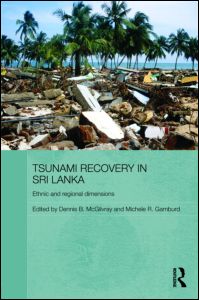Ilankai Tamil Sangam28th Year on the Web Association of Tamils of Sri Lanka in the USA |
|||
 Home Home Archives Archives |
Tsunami Recovery in Sri LankaEthnic and Regional Dimensionsby Dennis B. McGilvray & Michele R. Gamburd, Taylor & Francis (Routledge), September 2, 2011
The book is framed within this larger political and social context, offering descriptions and comparisons between two regions (southwest vs. eastern coast) and four ethnic communities (Sinhalese, Tamils, Muslims, and Burghers) to illustrate how disaster relief unfolded in a culturally pluralistic political landscape. Approaching the issue from four disciplinary perspectives - anthropology, demography, political science, and disaster studies - chapters by experts in the field analyse regional and ethnic patterns of post-tsunami reconstruction according to different sectors of Sri Lankan society. Demonstrating the key importance of comprehending the local cultural contexts of disaster recovery processes, the book is a timely and useful contribution to the existing literature. Contents Part 1: Overview and Context 1. Introduction Michele R. Gamburd and Dennis B. McGilvray 2. Building the Conflict Back Better: The Politics of Tsunami Relief and Reconstruction in Sri Lanka Alan Keenan 3. Conflict, Coastal Vulnerability, and Resiliency in Tsunami-Affected Communities Randall Kuhn Part 2: Ethnographic Materials 4. The Golden Wave: Discourses on the Equitable Distribution of Tsunami Aid on Sri Lanka’s Southwest Coast Michele R. Gamburd 5. The Sea Goddess and the Fishermen: Religion and Recovery in Navalady, Sri Lanka Patricia Lawrence 6. Dreaming of Dowry: Post-Tsunami Housing Strategies in Eastern Sri Lanka Dennis B. McGilvray and Patricia Lawrence Part 3: Disaster Studies 7. Actors in a Masala Movie: Fieldnotes on the NGO Tsunami Response in Eastern Sri Lanka Timmo Gaasbeek 8. Principles Ignored and Lessons Unlearned: A Disaster Studies Perspective on the Tsunami Experience in Sri Lanka Georg E. Frerks 9. Conclusion Michele R. Gamburd and Dennis B. McGilvray Editor Bios Dennis B. McGilvray is Professor and Chair of the Department of Anthropology, University of Colorado at Boulder. His research focuses on Tamil-speaking Hindus and Muslims of eastern Sri Lanka, including caste identities, matrilineal family patterns, popular religious traditions, and ethnic conflict. He is the author of Crucible of Conflict: Tamil and Muslim Society on the East Coast of Sri Lanka (Duke 2008) Michele R. Gamburd is Professor of Anthropology at Portland State University. She has performed ethnographic research in Sri Lanka since 1992 and her theoretical interests focus on globalization, gender relations, violence, and social change. Her most recent book is Breaking the Ashes: The Culture of Illicit Liquor in Sri Lanka (Cornell 2008)
| ||
 The Indian Ocean Tsunami, which devastated 70 percent of Sri Lanka’s coastline and killed an estimated 35,000 people, was remarkable both for the magnitude of the disaster and for the unprecedented scale of the relief and recovery operations mounted by national and international agencies. The reconstruction process was soon hampered by political patronage, by the competing efforts of hundreds of foreign humanitarian organizations, and by the ongoing civil war.
The Indian Ocean Tsunami, which devastated 70 percent of Sri Lanka’s coastline and killed an estimated 35,000 people, was remarkable both for the magnitude of the disaster and for the unprecedented scale of the relief and recovery operations mounted by national and international agencies. The reconstruction process was soon hampered by political patronage, by the competing efforts of hundreds of foreign humanitarian organizations, and by the ongoing civil war.